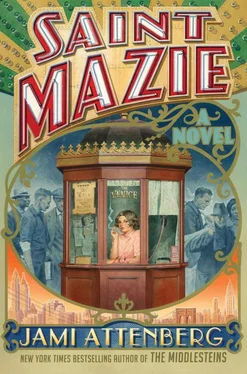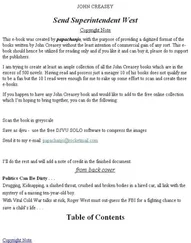I don’t know if we’ve ever had a fight before, Rudy and me, but letting the bums on the outside in, he isn’t having it. Early this morning, before I opened up the cage, he asked me inside. We sat in the balcony. I hadn’t been in the theater for nearly ten years. I’d forgotten what it looked like. Some theater owner I am. The screen was dark, and the lights were dim, and I was thinking that was for the best, that I wouldn’t want to look too close at anything. The air felt thick and dusty, like maybe I could hold it in my hand. But I could be wrong about everything. It smelled fine in there, not moldy, not boozy. And the chairs were still plush beneath me. Nice seats, high-class seats. Those seats were good enough for me and anyone else who walked through that door. Which was the point I was about to make.
Rudy said: We’re not a shelter or a flophouse, Mazie.
I said: I know we’re not. But they were the same as you and me six months ago. They had jobs and homes and money in their pockets. We’re no better than them. This city is just stricken.
Rudy said: People think we’re letting the bums run the place they’ll never come back again, even when they do have money.
I said: You know what the movies mean to you. Now think what it will mean to these fellas, too broke to have any kind of treat for themselves.
He said: You want to talk about what the movies mean to people? I don’t want to be rude but a lot of them, they’re not clean. It’s not their fault, but would you want to sit next to someone who doesn’t smell so great? You’ve saved up your pennies, some fella’s taking a girl he wants to impress, or this is your birthday present from your husband, say, and it’s a big night out on the town and, Mazie, you’re sitting in a theater filled with guys who haven’t washed in a week or two because they’re sleeping on the streets. I mean, who’s coming back for that? What’s going to happen to our business?
I heard him. I heard everything he said. It’s his business too, he’s put his whole self into it for so long. Front of the house is me, back of the house is Rudy. I know it. It’s the deal we made. But I’m breaking the rules.
I said: I’ll remind you it’s my business, Rudy.
He said: Mazie, please.
I said: It won’t be forever. And it won’t be all of them. Only the ones that can behave themselves.
He said: And how will you know?
I said: I’ve been looking at these lines of people for ten years. I know.
Mazie’s Diary, April 7, 1930
William’s been showing up every day to the Venice. Filching smokes off me, sometimes I’ll hand him change, and once I brought him a tiny bar of soap from home, didn’t say nothing, just slid it over to him. He nods, I nod. Rudy told me he snoozes quietly in the balcony for a show or two. I never even see him leave.
Sometimes I can’t tell if he’s drunk or just sad. It’s not a mystery I want to solve. I’ve no judgment either way, only I just want to know how to help him, if I can even help him. I know some of these lads you just have to give up on. But how can I give up on the one who sucked at my tit?
Mazie’s Diary, April 15, 1930
Haven’t seen William in a week. Asked around, nothing. Now he’s not even showing up in the mornings. I think I’ll walk the street tonight, see if I can find him. I don’t want him to get lost in the shuffle.
Mazie’s Diary, April 16, 1930
No William, but oh those streets, they’re good for no one at night. The bodies all around, not dead, but some of them seemed barely alive. Passed out, skin and bones beneath their filthy clothes. I gave them all I had in my pockets and kept digging to see if I could find more.
Mazie’s Diary, May 1, 1930
I found him tonight, in an alley off the Bowery, bleeding from his lip, a torn shirt, bleeding from there too. Some vomit down the front of him. He said he’d had work on a train and then he’d spent every cent he made, and what he didn’t spend a buddy of his had stolen from him the night before. And now here he was, bleeding in an alley. I waited with him till the ambulance came, and then I had a drink at Finny’s and then another, and then another, and I let a man walk me home and kiss me good night and touch my behind but I’d seen too much blood tonight to do any more than that.
Mazie’s Diary, May 4, 1930
Went to Tee’s church early this morning because I missed her. I sat through mass, and thought about her believing in those words. I confessed, and I did it with sincerity, and it felt good to speak some truth. Then I crossed myself in front of the shrine to see what the air felt like under my fingertips, if it changed, but it did not. The air is always the same. And I remembered I was still me.
Mazie’s Diary, July 8, 1930
Rosie’s back at her old tricks. It’s been months of it. I can’t move again. I can’t I can’t I can’t.
Oh, this block is dangerous now. Oh, that mission around the corner is bringing all the riffraff here. Oh, we should leave the city, move to Boston, move back to Coney Island, move uptown, move to Brooklyn, move where it’s safe and nobody’s hungry.
I said: Rosie, people are hungry all over this country.
She said: I know, I know! But that doesn’t mean I have to live among them.
I said: We used to live in a house with dirt on the floor. We ain’t no better than them.
She said: I don’t feel safe on this here block.
I said: You crazy old broad, you’re tougher than I am. Nothing scares you.
She said: If you were home more I’d feel safer. Especially at night.
I said: I can’t be home any more than I already am.
She said: I know where you go at night. I know where you go!
But how do I say to her that I need a drink at the end of the day? That a little hooch warms me, like I’m velvet on the inside and out. And that I need the company of men, that flirting feeds me better than her beef stew. Jesus, I need to remember what it’s like to be a woman and not just a bird in a cage. Tee’s gone now. Can I have this one thing? This one part of the day to be mine.
Mazie’s Diary, August 1, 1930
No one’s asking for change for a flop, it’s too hot. In the winter it’s all they dream of, getting warm. In the summer I’m noticing they don’t mind sleeping on the streets. It’s cooler outside than in one of those airless flops. They’ll take the dirt, they’ll take the sweat, over choking on the bad air. They’d rather pass out in the night breeze. Change for a meal, change for a drink, but no change for a home, not tonight anyway.
Mazie’s Diary, September 2, 1930
Jeanie called, said she’s been sick, hasn’t been able to dance, and crowds have been dying down. She’s in Chicago again, and that leg of hers is aching from the chill that rises off the big lake. I said I’d send her some money.
She said: That’s not why I called. I’m not begging for money.
I said: No one said you’re a beggar. I’m just offering. I have it. There doesn’t need to be a fuss about it.
She said: I don’t want you to think I can’t take care of myself.
I said: You’ve been away long enough that’s not even a question.
She said: I worry what you think of me.
I said: That’s a first.
I got sharp with her. I knew she was just playing a game with me. She’d called for money, plain and simple. I told her not to kid a kidder and she asked for a hundred and I sent it her way.
George Flicker
What happened was my father died very suddenly — this was in the summer of 1930—and it was devastating for everyone because he was such a good man, though he was not a young man, so at least we could all say, “Oh, he led a good life,” that sort of thing. Still, it was just awful, because he was so beloved. And then my mother died soon after that because she couldn’t live without him, and this was another devastation, because say what you will about my mother — and people had said plenty — she was a real force in the universe. Although no one was walking around saying, “Oh, she lived a good life,” because she never seemed particularly happy.
Читать дальше












